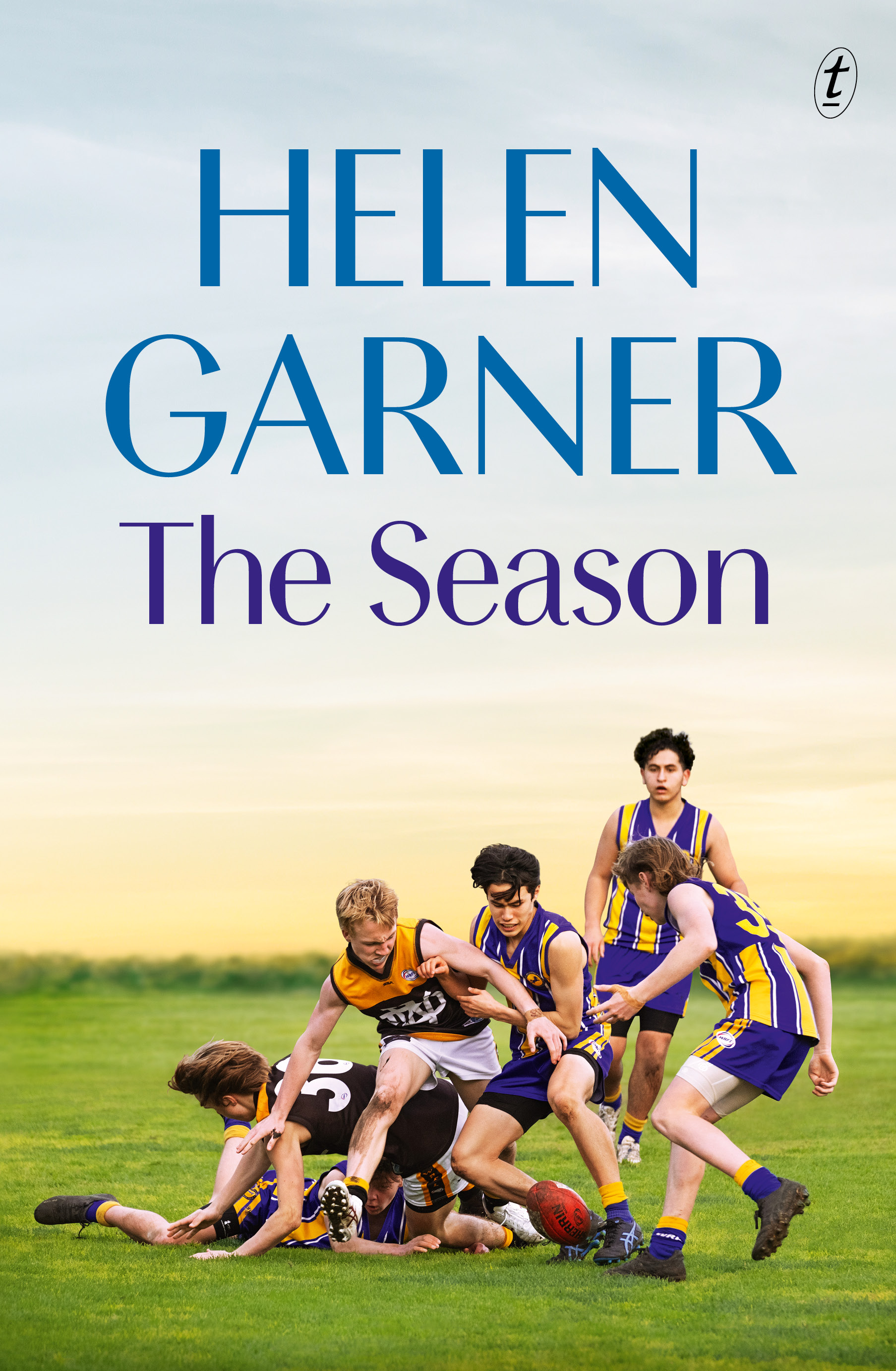
- Free Article: No
- Contents Category: Memoir
- Review Article: Yes
- Article Title: Silent witness
- Article Subtitle: A ‘little life-hymn’ from Helen Garner
- Online Only: No
- Custom Highlight Text:
Helen Garner has death on her mind. In recent decades, it has permeated her work in fascinating and unexpected ways. There is her novel The Spare Room (2008), which is about a woman’s struggles to care for a dying friend held hostage to dangerous delusions; This House of Grief (2014), a true-crime book about a devasting act of filicide; and, in her most recent volume of diaries, How to End a Story (2021), an account of the death of her marriage to the novelist Murray Bail.
- Featured Image (400px * 250px):

- Alt Tag (Featured Image): Jonathan Ricketson reviews ‘The Season’ by Helen Garner
- Book 1 Title: The Season
- Book 1 Biblio: Text Publishing, $34.99 pb, 189 pp
- Book 1 Cover Small (400 x 600):

- Book 1 Cover (800 x 1200):

- Book 1 Readings Link: https://www.readings.com.au/product/9781922790750/the-season--helen-garner--2024--9781922790750#rac:jokjjzr6ly9m
The ostensible subject of The Season (2024) is not death but the AFL. Happily, Garner has not written a sociocultural analysis of the game or a polemic. She is not interested in the sport’s darker undercurrents, in the effects of traumatic injury or the culture of misogynistic violence that Anna Krien explored in Night Games (2013). Instead, at the age of eighty, she has produced a personal account of her grandson, Amby, and his time in the sport. ‘It’ll be a nanna’s book about footy,’ as she puts it, with typical humility. Elsewhere, she describes it in starker terms: it will be ‘a record of the season we are spending together before he turns into a man and I die’.
The Season is a memoir of Garner watching Amby play for the Flemington Juniors in the Under-16s, from February to August 2023. She describes the project as ‘effac[ing] herself’ and becoming a ‘silent witness’. She drives Amby to his training sessions and his games and records what she sees there. Notebook in hand (‘the badge of [her] purpose’), she observes the ruckus of footy, the beauty and the bloodshed. The boys are thinly sketched and, aside from Amby, register only in outline: Angus, the ‘hothead’ with the diamond earring; Remy, the ‘natural leader’ with the loud, loud voice; Archie, the coach, with his roguish good humour and ‘face-splitting grin’.
As the months pass and the weather grows colder, Garner’s presence at the oval becomes less consistent. There are successes and failures with the Flemington Juniors, and, despite some equivocations, she persists with the project of witnessing. She also follows the Western Bulldogs and tracks her experience with their disappointing 2023 season. There is comedy in her struggle to comprehend the rules of the sport, despite a lifelong passion for it. Gradually, a theme begins to emerge: the civilising power of footy. Garner sees AFL as a form of communal ritual that sublimates male aggression and transforms it into something at times joyous and transcendent.
This is evident in her vivid images of the young football players. She sees them as ‘warriors’ locked in a titanic struggle. In the heat of play, they are ‘smeared with dark muck’, like ‘creatures from the Black Lagoon’; in victory, they ‘radiat[e] such charisma’, flushed with ‘wordless, incredulous ecstasy’. There are echoes of Garner’s past writing here, such as her vibrant portraits of the Greek and Italian students in the essay ‘The Schoolteacher’ (1972), or her admiration for the ‘youth and tenderness’ of the murdered Joe Cinque. She has long demonstrated a sentimental view of young men, particularly those who strike her as possessing spirit and strength.
One characteristic of Garner’s writing is her skilful use of ekphrasis, particularly in her dense, evocative descriptions of photographs. There is a striking passage where she describes a picture of Marcus Bontempelli consoling a teammate after a defeat. Garner is mesmerised by this ‘Homeric scene of brotherly tenderness and care’: Bont’s ‘cheek is pressed against the stumbling man’s shoulder’ and Bruce’s face ‘lowered in pain and despair’. In their resilience in the face of adversity, she sees great beauty and the young men as embodying some of the ancient heroic ideals.
By contrast, Garner casts a more critical eye on young women, who do not seem to stir her affections. In a jarring scene, she observes a group walking around the football oval: a ‘thickly made-up’ girl who brushes past Garner with a bulldog on a leash, turning around to ‘snarl’ at her ‘downcast acolytes’. It is a fleeting moment of unpleasantness, and it recalls Garner’s essay ‘The Insults of Age’ (2015), when she sees a schoolgirl with white ribbons in her hair taunting an old woman. Garner intervenes by seizing the girl’s ponytail with a yank (‘Give it a rest, darling!’).
Garner states that one purpose of The Season is to understand her grandson: ‘to learn what’s in his head’ and ‘what drives him’, before it is too late. However, over the course of two hundred pages, we learn little about Amby’s inner life, apart from his love of footy. Much of his life remains opaque. There is a static, repetitive quality to their endless conversations about positions, injuries, and plays. She is hesitant to disturb his privacy. In her self-appointed role as witness, a passive observer of events, Garner struggles to find the new angle she seeks, to glimpse the male delicacy and fragility that so lights up her curiosity.
This differentiates the book from much of Garner’s best writing, which is driven by productive tensions, a clash of wills between worthy adversaries. In Monkey Grip (1977), Garner navigates a relationship of attraction and repulsion with Javo, a semi-charming drug addict with eyes ‘as blue as blue stones’; in The First Stone (1995), there are the sulphurous interactions with a younger generation of feminists. The Season is sorely lacking in these charged, dynamic exchanges. As a result, it often feels like a memoir in soft focus.
James Wood has called Helen Garner a ‘savage self-scrutineer’, a writer who wrestles with her discomforts. She is willing to excavate the difficult and complex emotions that others would prefer to leave buried. In The Season, she writes with precision about the indignities of ageing, the bodily changes, about feeling marginalised and ignored. More than once, watching the training sessions, she notes that the boys do not care about or even notice her presence: ‘As always,’ she writes, ‘I am invisible to them.’ Occasionally, there are shades of darker emotions. Watching them ‘explod[ing] apart in laughter’, seeing them ‘jostle and shove and swear and bellow in their broken voices’, she feels the sharp sting of envy.
That emotion recurs in one of the book’s most memorable and affecting scenes. Garner is at the oval one night, alone, watching two ‘blocky and shapeless’ old men, kicking the footy around together, oblivious of her presence. They are fully absorbed in their efforts. Garner watches them, touched and envious and filled with a ‘melancholy regret’. She profoundly longs to join them, but knows they will never ask her and that she would not accept their offer if they did. Her refusal would not be due to writerly detachment. It would be because Garner has not kicked a football in seventy years: ‘I have forgotten how, and I’m afraid that if I try, I will make a fool of myself and people will laugh at me.’
The Season is Helen Garner in a minor key. Her prose is as luminous as ever. Although it does not contain the passion and the urgency that animates her greatest work, there is an elegiac tone in this ‘little life-hymn’ that lingers. There is the sense that time is passing far too quickly. She would rather spend it watching the boys play footy at dusk.


Comments powered by CComment